Businessman struggles to rebuild after race-hate attack
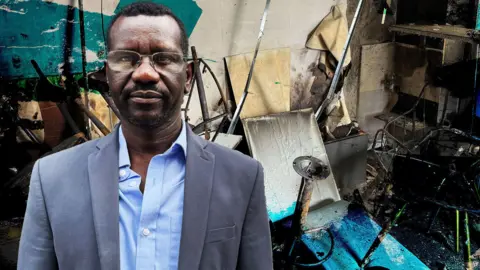 BBC
BBCA Sudanese man whose internet café was destroyed during racist disorder in Belfast last summer has described enduring a "financial nightmare" after his business insurance claim was rejected.
It comes as an author of a new report said the anti-immigration protest that led to violent rioting was "hijacked" by the far-right outside Northern Ireland to shape their own narrative.
Mohammed Idris' Bash Technologies was burnt down and he has struggled to recover financially or rebuild his business.
He was told his insurance claim was "regrettably irrecoverable" because the damage to his rented premises was done in a riot.
Mr Idris is now going through the "very long and difficult process" of seeking support through a government scheme.
The report by the technology organisation Rabble Cooperative mapped "far-right activity" on social media.
Tommy Robinson tweet
It found that the intervention of accounts from the Republic of Ireland and Great Britain, including that of anti-Islam activist Tommy Robinson, "elevated" last August's protest into "an international spectacle" online.
It was the murder of three children in Southport at the end of July that sparked riots in towns and cities across the UK.
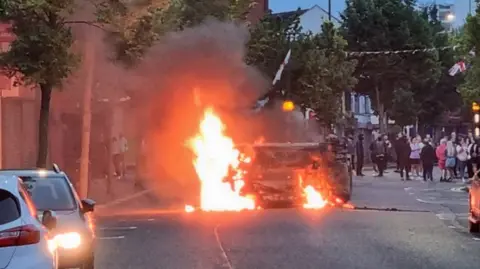 PA Media
PA MediaThis triggered the anti-immigration march in Belfast, which descended into violent street disorder and the burning down of a number of Muslim-owned businesses – one of which was owned by Mr Idris.
"It's affected my mind, it's a nightmare," he told BBC News NI.
"All this process, all these hassles – it is a mind torture. I'm exhausted. We are just living day to day."
He said the struggle of having to repair the destroyed premises before handing it back to the landlord, and trying to rebuild the business elsewhere in the city, had become "too much" for his wife, children and him.
"For no reason, I have to go through all this," he said.
"I'm supposed to be stable and I have to look after my business and my family, but unfortunately I have to deal with consequences of some people who just attacked me for no reason."

NI was 'plaything for other forces'
The report also looked at several other anti-immigration and racist incidents that have taken place across Northern Ireland over the past year.
The aim for Rabble Cooperative - a tech company that carries out work for human rights organisations - was to determine the extent to which the disorder and attacks were being fuelled by orchestration, disinformation and misinformation online.
Dessie Donnelly, who co-authored the report, told BBC News NI that only "a relatively small" and "loose network of people and accounts" were identified locally as having promoted the rally.
He told BBC News NI that we in Northern Ireland had been "the playthings of other forces".
In its examination of the August 3 protest, the report, which was commissioned by the Committee on the Administration of Justice and Unison, identified 35 accounts as having promoted it on Facebook with "relatively low" engagement.
The majority of those accounts – 69 per cent – could be characterised, according to the report, as self-identifying with Ulster loyalism.
However, social media engagement surged when the then Irish Freedom Party member Tracy O'Hanlon subsequently posted a promotional image of the event on X.
Tommy Robinson, former leader of the now-defunct English Defence League, then posted on August 2 – the day before the protest took place.
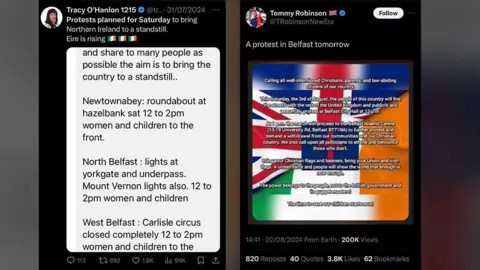
According to the report, those two posts garnered a total of more than 7,000 positive engagements and around 100,000 and 200,000 views respectively.
During the protest in Belfast city centre, a number of anti-immigrant protesters from Dublin joined the crowd – waving a tricolour alongside union flags.
A video of this was shared by Republic of Ireland-based anti-immigrant activist Mick O'Keeffe on X, achieving 5.7 million views.
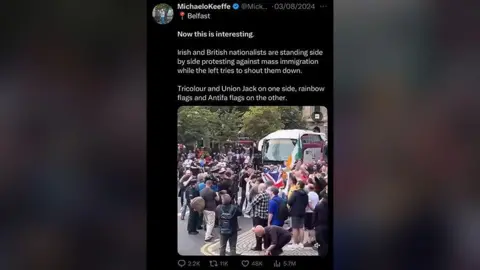
'Public narrative based on disinformation'
According to the report, the video and accompanying text were subsequently amplified across a wide-range of anti-immigrant Facebook accounts, seemingly based in Britain and the Republic of Ireland, and further amplified by accounts on Instagram.
"What you saw from this kind of amplification was really framing a public narrative based on disinformation and trying to popularise that as much as possible," Mr Donnelly said.
"What the local accounts lacked that the external accounts had was sophistication in terms of how they played the platforms' algorithm.
"Locally, they weren't getting much traction in terms of views, in terms of shares, in terms of likes.
"And then when it moved to the more notorious far-right actors, you saw replication of content, you saw all the signs that they knew how to play the algorithm and suddenly you're getting 2.3 million views on something."
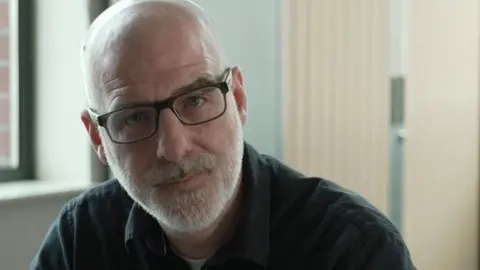
He said the external perception this created was that nationalists and unionists in Northern Ireland were uniting against immigration, which in reality, he said, did not appear to be the case.
"Clearly the intervention of external actors was very big because you saw that we were part of a bigger agenda or we were the tail-end of someone else's story or narrative. That we were being slotted into a narrative," Mr Donnelly added.
"That doesn't say that that sentiment doesn't exist here, but it certainly doesn't gain the traction that it does across the water or in our neighbouring jurisdictions, it just doesn't happen.
"So realising that we were the playthings of other forces was very telling."
